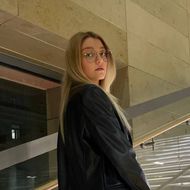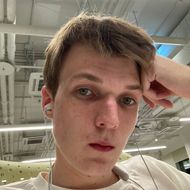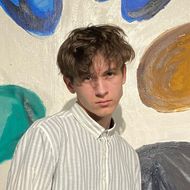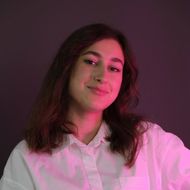'Here, You Can See Science in Action': HSE University-St Petersburg Students on Internships at Large Companies
At HSE University-St Petersburg, professors pay a lot of attention to the practical training of students. Thanks to it, students are able to build their careers in the companies of their dreams starting from the first years of their studies. Today's heroes know about it firsthand as they undertook internships at 'Yandex', 'Gazprom Neft', 'Air Gate of the Northern Capital', ANCOR and Selectel. Find out how the selection process to top companies went, what tasks the students performed during the internship and what they remembered the most in our new article.
.jpg)
Anna Riupina, a 4th-year student of the Bachelor's programme 'Physics', undertook an internship at 'Gazprom Neft' as a research assistant

When I was in the 11th grade, I happened to go on an excursion to the Scientific and Technical Centre (STC) of 'Gazprom Neft'. The company impressed me as here you can see science in action! Then, I decided that I wanted to undertake an internship here one day. Last year, on the STC website, I saw a vacancy for a research assistant and filled in the application without any doubt.
The first selection stage was a competition of resumes. There, I specified the courses I studied at HSE University and the professional experience of a physics teacher at an online school. I also noted that I was proficient in Python, Wolfram Alpha and Latex. After that, I passed an interview where they asked me questions within the programme's curriculum—even something about quantum mechanics.
The internship lasted for a bit less than three months. As a future physicist, I received tasks related to solving differential equations. We need them to identify the properties of gas and its condensate. Knowing these properties helps to extract gas more efficiently. Of course, I didn't do it manually but used the programmes Wolfram Mathematica and MatLab.
During the internship, I benefited so much from the HSE courses: 'Differential Equations' and 'Mathematical Physics'. The course 'Numerical Methods' would be useful as well as they teach how to use programmes which I applied to the calculations but it started only in the fourth year.
Most of all, I remember the beginning of the internship when I was given a task with plenty of oil and gas terms which I had not known yet—it was interesting to immerse myself in a completely new sphere. Another surprise was that some theoretical things such as rules of solving integrals and equations, often became simpler in practice. But in the end, I made sure that you couldn't do without theoretical physics and mathematics. Even such a seemingly simple process as mining directly depends on the right calculations and well-applied theory though simplified sometimes.
Now, I am carrying out research at the International Laboratory of Quantum Optoelectronics. The internship and work in the laboratory cover different branches of physics. But it did not scare me, quite the opposite—I found it very interesting to try myself in various directions to realise what I truly want to do. At the moment, I am more inclined to quantum optoelectronics and am writing a thesis in the Laboratory on this topic. I'm planning to choose a master's degree with a similar concentration.
Andrey Panov, a 2nd-year student of the Bachelor's programme 'Applied Mathematics and Information Science', undertook an internship at 'Yandex' as a backend developer

I knew about internships at 'Yandex' even back in high school. The company always attracted me with the fact that it created one of the largest and most recognised products in Russia. This is why I set a goal to have an internship there. In February of my first studies year, I saw a vacancy on the official website and sent my resume.
The selection process for the internship was typical for the IT sphere and lasted for two months and a half. Firstly, one had to solve several sections with algorithms and then pass a technical interview with the team. In our programme, the course in algorithms is good so I dealt with the sections quickly. During the interview, they asked me what technologies I could use proficiently. I told them that as a project assignment, other students and I created a strategic computer game with a multiplayer. Thanks to it, I have experience working with a remote call system by Google—gRPC, a data serialisation tool Protobuf, and a database sQLite.
My internship lasted for three months. In September, I had to combine work with studies but it wasn't hard—'Yandex' is favourably disposed towards students' schedules. I engaged in the support and maintenance of a heavy-loaded internal service. For this, I used the knowledge received in the first year, in particular during the courses 'The Programming Language C++' and 'Basics of Programming Methodology'. I learnt some things in the process: for instance, to work with databases and to programme in Java. We will study it this year so it will be easier for me to grasp the material.
But the most interesting thing was to dive into the professional community! 'Yandex' holds a lot of internal events for the staff where you can meet senior colleagues and ask for advice. Thanks to that, I managed to develop my soft skills—I am sure that it will be beneficial for my future career as well.
The internship helped me to realise that working in the IT sphere is to my liking. The programme gives me a powerful basis of fundamental knowledge for it. But you shouldn't lag behind trends as well: the sphere is developing rapidly, and you have to study new approaches to solving technical tasks—this is what I am planning to do next year. Luckily, the programme also offers such an opportunity: our professors are practising programmers who share their up-to-date inventions.
Elizaveta Belysheva, a 3rd-year student of the Bachelor's programme 'Law', undertook an internship at 'Air Gate of the Northern Capital'

In November of last year, HSE University organised a meeting with the CEO of 'Air Gate of the Northern Capital' and other employees where they told about the work directions there were in the airport. After the meeting, we had a chance to ask HR specialists questions or even schedule an interview which I did. It seemed to me that it would be a very extraordinary experience, and I was curious to find out how an airport works from the inside and what lawyers do there.
To undertake an internship, one had to present themselves to an HR specialist and tell about their results in studies and internships. They also asked me about my position in the student rating and my grades as well as gave me several cases to see my chain of reasoning.
During a month, I was preparing documents for court hearings and writing counsel's opinions on different questions. I also analysed the amendments to laws which influenced the work of the airport and helped senior colleagues to solve issues related to hiring and dismissing employees. The Law Faculty prepared me well for such tasks—I benefited from the knowledge received during the main courses (Civil, Administrative and Criminal Law) as well as while studying Roman Law.
My colleagues were amazing—this is what I remember the most! They took me to hearings in the commercial court and even a check conducted by the Investigative Committee. It was very interesting to see how the law worked in reality. Perhaps, the happiest moment was when I managed to solve a difficult case which caused doubts even among much more experienced colleagues.
The life of a lawyer is far from what we see in films but it is no less interesting—this is the most important thing I realised over this time. I saw how much responsibility falls on lawyers even in an airport, and this fact motivated me to study harder. I haven't finally decided yet which concentration I will choose, I'll try various things. But I am sure that my life, one way or another, will be related to law.
Daniil Gurin, a 3rd-year of the Bachelor's programme 'Sociology and Social Informatics', is undertaking an internship at 'ANCOR' as a UX researcher

During the Career Week at HSE University-St Petersburg, I attended a lecture by a speaker from ANCOR. She told us how a student could find a job and build his career trajectory. This question was of great interest to me at that time, and I visited the company's website. It turned out that ANCOR was looking for the position of UX intern-researcher. So I decided to apply to solidify the knowledge received in the programme.
The selection process took place in several stages: a phone interview, an interview with an HR specialist and a test assignment. During the interview, they asked me questions on theoretical knowledge from the university and additional literature which I read myself. The test assignment offered me to analyse the market of ATS products for recruitment and present the results. It wasn't hard because I presented similar projects in the programme quite often.
During the internship, I carried out research on internal ANCOR products which helped companies to manage the electronic personnel document system. I conducted interviews, worked with quantitative data in Excel, wrote guidelines and created research designs for our clients. I knew how to do many of those things thanks to HSE courses. But I also had to do some things for the first time—for instance, create a research plan based on a client's brief. But it is okay as no one expects an intern to know everything. The most important thing is not to be afraid of making mistakes and asking questions.
The most interesting memory of the internship is brainstorming with my senior colleagues! They were always open to my ideas and willingly shared their experience—this was very valuable and useful.
It just happened that the internship is closely related to my work in the research laboratory 'Sociology in Education and Science'. In both places, I work with qualitative and quantitative data and conduct interviews. The only difference is the subject area. In the laboratory, I engage more in the educational system and the place of school students in it while during the internship, I immerse myself in the product sphere.
Having tried myself in different fields, I realised that I am very keen on the sphere of UX research. I would like to develop in it further. That is why the main plan for the next year is to undertake another internship to gain some experience for my future career.
Alexandra Rafail, a 3rd-year student of the Bachelor's programme 'Economics', is undertaking an internship in 'Selectel' as an IT-sourcer

I learnt about the internship from a first-year student whose curator I was. In a general chat, she wrote that the company Selectel was looking for an HR specialist and asked those who were interested in this sphere to send their resumes. In the course of my active extracurricular life, I realised that I liked working with people. So I decided to try.
To be selected by the company, one had to forward their resume and pass three interviews. I didn't have much work experience so in my resume, I told about the extracurricular activities. I extensively described my tasks as a curator, in the student organisation 'Students for Students' (SDS), the Career Centre, and told about volunteering activities and teaching assistance. The interviews were not hard: they told me about my future tasks, checked my motivation and soft skills and asked me what kind of specialist I saw myself in the future and how a company could help me to become one.
In the end, I was accepted for the internship for three months! One month and a half has already passed. I draw up requirements for future employees for different positions, carry out the first screening of the candidates and help to automate the companies' processes. For instance, now, together with the developers’ team, we are creating software for job applications so that recruiters won't lose track of potential applicants. Here, I benefit from the knowledge I received during HSE courses in digital literacy, statistics, game theory, behavioural economics, and a minor course in data processing and analysis.
Over the internship, most of all, I remember the moment when in one week, three people who I selected received an offer from the company. My colleagues also remarked on this achievement, and I felt how valuable my work was straight away!
During this month and a half, I realised that I made the right choice of concentration. That is why I want to develop in this sphere and undergo training in new hard skills. I also plan to apply for a master's degree but I haven't decided yet where—maybe, in Moscow or abroad. But I don't forget about extracurricular activities—I am a member of the SDS Small Council, and for the whole year, our team will hold traditional HSE events.

